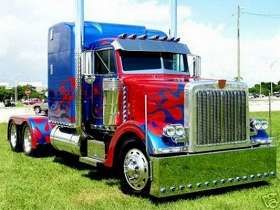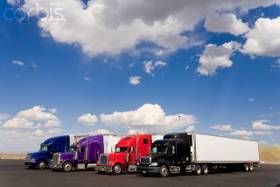It Would Be Nice If A CDL Spoke For Itself.
Topic 1627 | Page 2

I understand how you feel, and what you mean to say. But it all hinges on LIABILITY. Because of this, the insurance companies can dictate to the trucking companies who they can hire. That is why there is disparity in the hiring requirements from company to company... it is their insurance carrier that "helps" them determine the experience level of their new hires. There are also requirements by some shippers, determined by their perceived or the actual value/importance of their product being shipped.
You are responsible for how you drive, but the carrier and insurance company are ultimately liable for your conduct while driving THEIR truck.
Shipper:
The customer who is shipping the freight. This is where the driver will pick up a load and then deliver it to the receiver or consignee.

Sure, it would be just as nice if I had my own truck. 

Virtual reality aside, I didn't mean to sound antagonistic to the business at large. The rest was merely to say that I have nothing but respect for companies who recognize that my CDL means business (as much as I did for acquiring it). I certainly intend to validate such opportunities with an equal level of respect and loyalty—we can both get it right and stay on the same team.
CDL:
Commercial Driver's License (CDL)
A CDL is required to drive any of the following vehicles:
- Any combination of vehicles with a gross combined weight rating (GCWR) of 26,001 or more pounds, providing the gross vehicle weight rating (GVWR) of the vehicle being towed is in excess of 10,000 pounds.
- Any single vehicle with a GVWR of 26,001 or more pounds, or any such vehicle towing another not in excess of 10,000 pounds.
- Any vehicle, regardless of size, designed to transport 16 or more persons, including the driver.
- Any vehicle required by federal regulations to be placarded while transporting hazardous materials.

As for the others, I was just as willing to meet them halfway (but now I'm once bitten twice shy, in other words). Money isn't everything (to me).
TWIC:
Transportation Worker Identification Credential
Truck drivers who regularly pick up from or deliver to the shipping ports will often be required to carry a TWIC card.
Your TWIC is a tamper-resistant biometric card which acts as both your identification in secure areas, as well as an indicator of you having passed the necessary security clearance. TWIC cards are valid for five years. The issuance of TWIC cards is overseen by the Transportation Security Administration and the Department of Homeland Security.
Steven, it seems you have a very common misperception that obtaining your CDL means you've actually proven you're a competent truck driver and entitles you to any job you'd like to have.
I think one of the hardest lessons that every new driver has to swallow is the harsh reality that schools only teach about 2% of what you'll need to know to be at the level of the veterans out there. In other words, as hard as it was to get that CDL, that was a cake walk compared with the learning curve that lies ahead.
You're in good company though. A lot of drivers feel that way. They think that CDL means more than it does. Any clown can shift a truck or get it parked on a sunny afternoon in June. But carrying only 10,000 pounds of freight (making that truck like a giant sailboat) across I-80 in Wyoming in the winter with snow-covered roads and 60 mph crosswinds for 200+ miles is not something you've proven you can do by taking a 10 minute road test and doing a few backing maneuvers for the DOT.
Let me say one last thing. A lot of new drivers never make it through their initial training on the road with their first company and the #1 reason is because they think they know more than they do. They won't listen, won't learn, and won't do as they're told. They think they've already proven they know how to handle a rig and they know the laws so they're ready to be a big time driver now. Nothing could be further from the truth and hopefully you'll figure that out quickly. Nothing good comes from thinking you know more than you do or thinking you're better than you are. Stay humble and expect to prove yourself continuously for quite a while. Even once you've survived your initial training on the road you then have to prove yourself to your dispatcher in order to earn the best runs, the best miles, and the special favors that the top tier drivers have earned.
Proving yourself in trucking is everything. It only takes one moment of inattention or one tiny miscalculation to ruin a lot of lives in an instant. Nobody is going to give a rookie the benefit of the doubt with 80,000 pounds of rolling steel and minivans full of children everywhere you look. You have to earn it by proving you can do it over time.
CDL:
Commercial Driver's License (CDL)
A CDL is required to drive any of the following vehicles:
- Any combination of vehicles with a gross combined weight rating (GCWR) of 26,001 or more pounds, providing the gross vehicle weight rating (GVWR) of the vehicle being towed is in excess of 10,000 pounds.
- Any single vehicle with a GVWR of 26,001 or more pounds, or any such vehicle towing another not in excess of 10,000 pounds.
- Any vehicle, regardless of size, designed to transport 16 or more persons, including the driver.
- Any vehicle required by federal regulations to be placarded while transporting hazardous materials.
DOT:
Department Of Transportation
A department of the federal executive branch responsible for the national highways and for railroad and airline safety. It also manages Amtrak, the national railroad system, and the Coast Guard.
State and Federal DOT Officers are responsible for commercial vehicle enforcement. "The truck police" you could call them.
Dispatcher:
Dispatcher, Fleet Manager, Driver Manager
The primary person a driver communicates with at his/her company. A dispatcher can play many roles, depending on the company's structure. Dispatchers may assign freight, file requests for home time, relay messages between the driver and management, inform customer service of any delays, change appointment times, and report information to the load planners.
I'm okay with it. There are multiple viewpoints one can have on the matter. My options speak for themselves, so I will trust in them.

Steven B. There is a CDL school in Pasco, WA that pumps out proud, know-nothing cdl holders every 2 weeks. When I went there, they were pumping out proud, no nothing cdl holders in 5 days. I challenged the class, and got mine in 4 days. So why was I special ?? I'd driven truck before...farm truck, cattle truck, logging truck. But all in the safe confines of Oregon. Was I prepared to get behind the wheel of our Pete and head across the US with a trailer load of someone else's crap ?? Hell no !! I was a daily threat to myself and others for weeks and weeks....WHY ?? Because, I knew I'd driven truck before, so I thought all I needed was a cdl, when what I really needed was a swift kick in the azz, and alot of reality check. Looking back on it now, I marvel at the difference between driving a log truck, pulling logs, down a dirt/gravel road to the mill, and driving a Petercar, pulling a load of freight down 2 lane roads in NC. If I'd wrecked with the logs, I'd have hurt me, and the log truck. If I'd wrecked anywhere else on a public road, I could have cost people that were loved their lives. Driving is a PRIVILEGE, not a right. And driving a Big Rig is one hell of a privilege that you have to earn by convincing the outfit that owns it that you won't wreck it/kill yourself/ or others..Its a fact you will have to live with. When you go to get your first driving job, ****y may get you thru the door of the building, but I doubt it gets you thru the door of their truck....
CDL:
Commercial Driver's License (CDL)
A CDL is required to drive any of the following vehicles:
- Any combination of vehicles with a gross combined weight rating (GCWR) of 26,001 or more pounds, providing the gross vehicle weight rating (GVWR) of the vehicle being towed is in excess of 10,000 pounds.
- Any single vehicle with a GVWR of 26,001 or more pounds, or any such vehicle towing another not in excess of 10,000 pounds.
- Any vehicle, regardless of size, designed to transport 16 or more persons, including the driver.
- Any vehicle required by federal regulations to be placarded while transporting hazardous materials.

Oh, I had much more comprehensive training than that, so my perspective is perhaps less typical of the assumptions employers make.
New Reply:
New! Check out our help videos for a better understanding of our forum features

















Preview:
This topic has the following tags:
Advice For New Truck Drivers Becoming A Truck Driver Choosing A Trucking Company First Solo Months On The Road Getting Your CDL Life On The Road







 TT On Facebook
TT On Facebook
I understand the sentiment, however going back to the spirit of equal opportunity employment (which I think should be extended to validate standards of education): no matter who I work for, I am the person held accountable for my driving from day one—it is in my best interest to respect this above an employer who does not. If the DOT says I am a professional driver, this should be recognized, given that job requirements are equal, objectively speaking (the safety experts do not care who my employer will be, but that I proved to them I was competent in the first place—I could just as well be an independent operator hauling anything by the book, in their experienced eyes). Given the number of variables involved, the senior drivers are perhaps as likely to become complacent and be involved in a preventable accident as a new CDL holder who has not developed bad habits, while the standards were designed to keep all of us from making that mistake in particular. That's where I am coming from, and I will not take myself any less seriously than this job demands, regardless of who else thinks they know better (than those who made the actual rules of the road). Subjective rules are not really my concern—just an unfortunate obstacle that I might just as well leave in the fast lane (this isn't a rat race, I insist).
CDL:
Commercial Driver's License (CDL)
A CDL is required to drive any of the following vehicles:
DOT:
Department Of Transportation
A department of the federal executive branch responsible for the national highways and for railroad and airline safety. It also manages Amtrak, the national railroad system, and the Coast Guard.
State and Federal DOT Officers are responsible for commercial vehicle enforcement. "The truck police" you could call them.
HOS:
Hours Of Service
HOS refers to the logbook hours of service regulations.